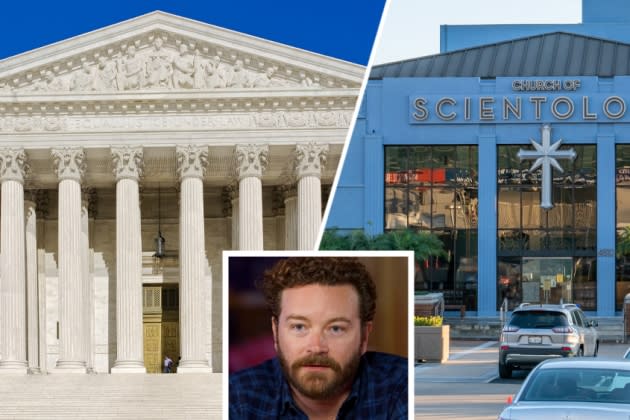Danny Masterson Rape Accusers See Church Of Scientology’s U.S. Supreme Court Petition Denied
- Oops!Something went wrong.Please try again later.

The Supreme Court begins a new term today, but the Church of Scientology and Danny Masterson won’t be on the docket.
In a brief missive released this morning, the SCOTUS “denied” the David Miscavige-led organization’s petition for a writ of certiorari of earlier this summer to stop former members of the church from taking the group to court.
More from Deadline
Supreme Court To Hear Challenge To Liability Protections For YouTube And Other Tech Platforms
Danny Masterson Rape Accusers See Church Of Scientology Petition U.S. Supreme Court
Supreme Court Justices Face New Harassment After Activist Group Offers Bounty For Sightings
With That ’70s Show star Masterson set to go on trial on October 11 for multiple sexual assault charges, the Church could now find itself facing more scrutiny in a revived suit from four women who have claimed they were put under surveillance by the Church, repeatedly harassed and had pets slaughtered after going to the LAPD with their claims against the actor.
Having seen their efforts eventually blunted in California courts, Scientology was hoping to have SCOTUS intervene and put the brakes on the quartet’s 2019 filed legal action. A hope that was dashed in D.C. this AM.
From the start, Scientology has said that the matter of the harassment and surveillance accusations had no place in the courts. The notoriously publicity shy Church declared that due to paperwork the plaintiffs had signed as members of Scientology, such issues had to be dealt with behind closed doors in “religious arbitration.”
Initially it looked like Scientology and by inference Masterson might have blocked the pursuit by the four women to make the matter public, with the courts backing their stance. However, earlier this year, the Court of Appeal firmly overturned that lower court decision on a First Amendment basis.
“We hold that once petitioners had terminated their affiliation with the Church, they were not bound to its dispute resolution procedures to resolve the claims at issue here, which are based on alleged tortious conduct occurring after their separation from the Church and do not implicate resolution of ecclesiastical issues,” wrote California’s Second Appellate Court.
In their petition of July 19, Scientology and their Jeffer Mangels Butler & Mitchell LLP and Winston & Strawn LLP lawyers put the spotlight on the religious freedom itself. They said that the Golden State appeal court sought to “weaponize the First Amendment against religious freedom, holding that the First Amendment requires limitations applicable only to religious — and not to secular — arbitration agreements.”
In the clear hopes that SCOTUS’ conservative super majority would pick up the fight, the petition also said that “American courts have long recognized the right of religious institutions to use dispute resolution procedures derived from and guided by their foundational beliefs and scripture.”
Though today allowing Scientology to file “a brief as amici curiae,” the Supreme Court has decided to sidestep this matter as it heads into what many predict to a controversial new term.
In its order list put out this morning, the High Court did decide take up the petitions of nine new cases, including Gonzalez v. Google. Hoping to ward off long anticipated redefinitions of responsibility, the tech company wants to stymie the family of Nohemi Gonzalez, who was killed in Paris in a 2015 ISIS terrorist attack. The YouTube parent company was sued by the Gonzalez family for the hosting of ISIS recruitment videos on the platform. Previously, the 9th Circuit Court of Appeals agreed with a lower court ruling that Google was protected from liability under Section 230 of the 1996 Communications Decency Act. A favorite target for those on the right and the left, Section 230 affords tech companies from being held accountable for almost all third-party content. The Gonzalez family successful petition sets up a battle that could see Section 230 dragged into the digital realities of the 21st century
For the unsuccessful Scientology, the focus will shift to the Masterson trial set to start in just over a week in Los Angeles Superior Court.
Masterson, a longtime Scientologist, was arrested in June 2020 on three counts of forcible rape that allegedly occurred in 2001 and 2003 at his Hollywood Hills home. Masterson, who was subsequently dropped from Netflix’s Ashton Kutcher co-starring comedy The Ranch at the end of 2017 as claims became known, has always denied having nonconsensual sex with anyone.
Out on an $3.3 million bail, the actor faces a possible maximum sentence of 45 years to life in state prison if found guilty. The case of the four women challenging Scientology directly has been paused until Masterson’s trial is over.
Best of Deadline
James Bond Movies In Order: Filmography, Bond Women & Iconic Villains
The Royals And Politicians Of 'The Crown' And The Actors Who Play Them — Photo Gallery
Sign up for Deadline's Newsletter. For the latest news, follow us on Facebook, Twitter, and Instagram.

